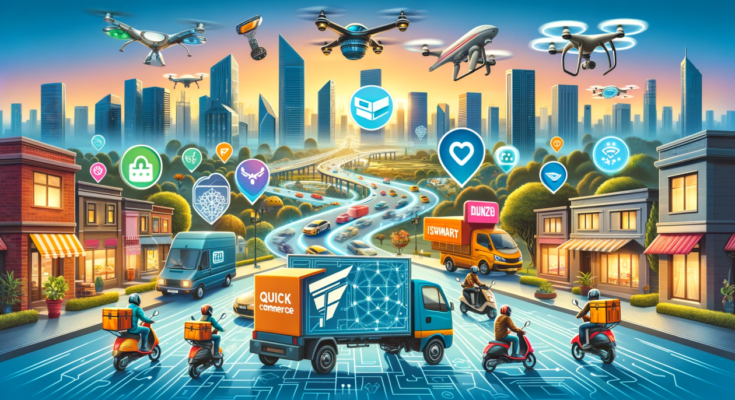In recent years, the landscape of commerce in India has undergone a dramatic shift. It’s not just e-commerce shaking things up; quick commerce has emerged as the new player on the block. This blog post dives into the future of quick commerce in India’s diverse market, exploring the factors driving its rapid growth and the impact it’s having on urban millennials, tech-savvy shoppers, and small business owners.
Understanding Quick Commerce
Quick commerce, also known as q-commerce, is about delivering goods to consumers in record time, often within minutes of placing an order. Think of it as the love child of e-commerce and hyperlocal delivery services.
India’s unique combination of dense urban centers and a growing middle class makes it fertile ground for quick commerce. People want convenience, and they want it now.
The Rise of Quick Commerce in India
Q-commerce has seen a meteoric rise in India thanks to technological advancements, increasing internet penetration, and changing consumer behavior. Companies like Dunzo, Swiggy Instamart, and Zepto are leading the charge, offering everything from groceries to gourmet meals in under an hour.
For tech-savvy shoppers, the promise of near-instant gratification is irresistible. No more waiting days for an online order to arrive; with q-commerce, you can have what you want almost instantly.
Why Urban Millennials Love Quick Commerce
Urban millennials are at the forefront of India’s q-commerce boom. These young, tech-savvy individuals are always on the go, balancing hectic work schedules with social lives. For them, the convenience of quick commerce is a game-changer.
Imagine running out of coffee just as you’re about to start your day. With a few taps on your smartphone, you can have freshly ground beans delivered to your door in minutes. It’s this level of convenience that is winning over millennials across India’s bustling cities.
Impact on Small Business Owners
While q-commerce offers immense benefits to consumers, it also presents significant opportunities for small business owners. By partnering with quick commerce platforms, local vendors can reach a wider audience without the need for extensive marketing or logistics infrastructure.
For instance, a local bakery can now offer its freshly baked goods to customers miles away, something that was previously challenging due to logistical constraints. Q-commerce platforms provide the necessary technology and delivery infrastructure, allowing small businesses to focus on what they do best—creating great products.
The Technology Driving Quick Commerce
The backbone of quick commerce is cutting-edge technology. Advanced AI algorithms, real-time data analytics, and robust logistics networks work together to ensure timely deliveries.
Tech-savvy shoppers appreciate the seamless user experience offered by q-commerce apps. From easy search functionality to secure payment gateways, every aspect is designed to make the shopping experience as smooth as possible.
Challenges Facing Quick Commerce in India
Despite its rapid growth, quick commerce faces several challenges in India. The country’s diverse geographical landscape, varying internet connectivity, and regulatory hurdles can pose significant obstacles.
For tech-savvy shoppers, issues like inconsistent delivery times and limited availability of certain products can be frustrating. However, technology and innovation continue to drive solutions to these challenges.
Role of AI in Quick Commerce
Artificial Intelligence plays a pivotal role in the success of quick commerce. From predicting consumer demand to optimizing delivery routes, AI helps streamline operations and improve efficiency.
For instance, AI algorithms can analyze purchasing patterns to stock popular items in local warehouses, ensuring they are readily available for quick delivery. This not only enhances the shopping experience but also reduces operational costs.
Sustainable Practices in Quick Commerce
Sustainability is becoming increasingly important for urban millennials and tech-savvy shoppers. Quick commerce companies are responding by implementing eco-friendly practices such as using electric vehicles for deliveries and minimizing packaging waste.
These efforts not only appeal to environmentally conscious consumers but also contribute to the long-term viability of the quick commerce model.
Future Trends in Quick Commerce
The future of quick commerce in India looks promising. Emerging trends such as drone deliveries, automated warehouses, and personalized shopping experiences are set to revolutionize the way we shop.
For small business owners, staying ahead of these trends will be crucial. By leveraging the latest technologies, they can continue to thrive in an increasingly competitive market.
Case Studies of Quick Commerce Success
Several quick commerce companies have already achieved remarkable success in India. For example, Zepto, a startup founded by two Stanford dropouts, has quickly become a household name by offering 10-minute grocery deliveries in major cities.
Such success stories inspire both consumers and small business owners, showcasing the immense potential of quick commerce in India’s diverse landscape.
Conclusion
Quick commerce is transforming the way Indians shop, offering unparalleled convenience to urban millennials, tech-savvy shoppers, and small business owners alike. While challenges remain, the future looks bright for this burgeoning industry.
If you’re keen on exploring the world of quick commerce, now is the time to get involved. Whether you’re a consumer looking for fast, reliable deliveries, or a small business owner seeking to expand your reach, quick commerce offers endless possibilities.
Stay tuned for more insights and updates on the evolving landscape of quick commerce in India. Your next shopping experience could be faster and more convenient than you ever imagined!




